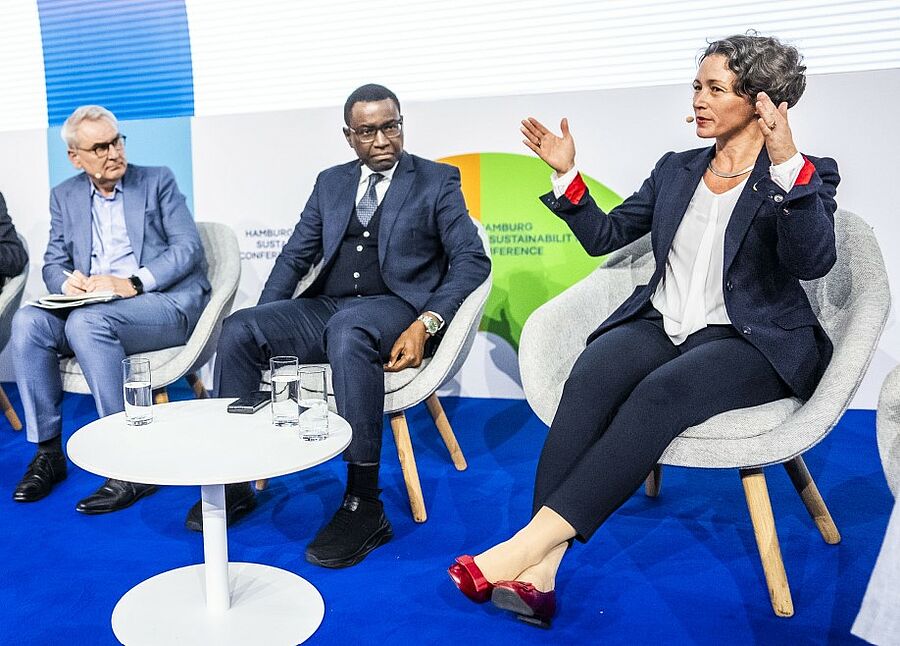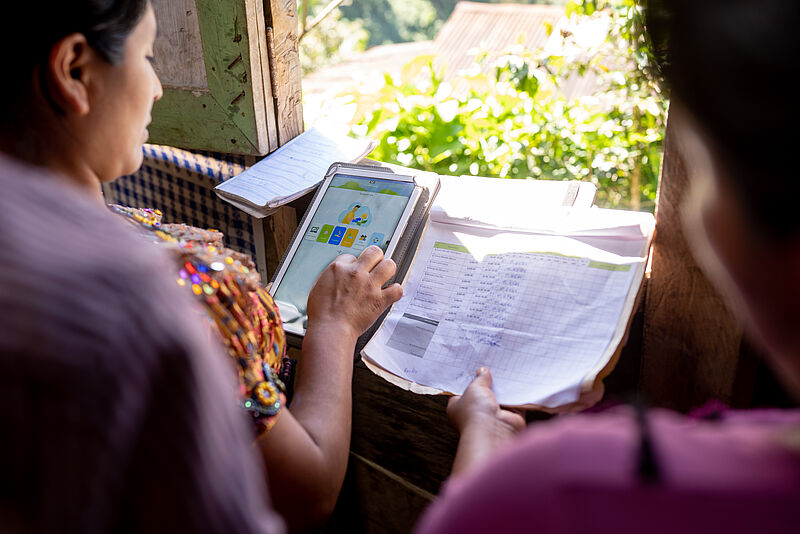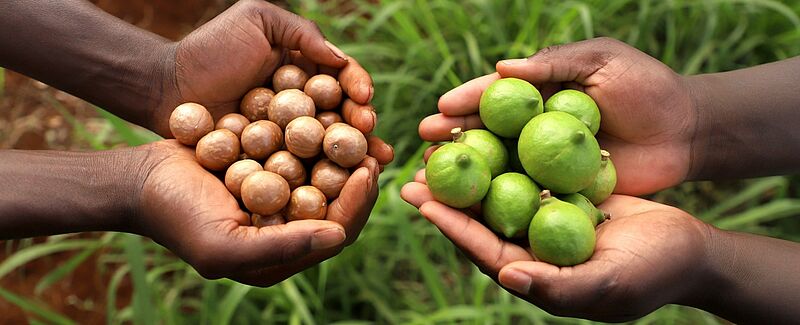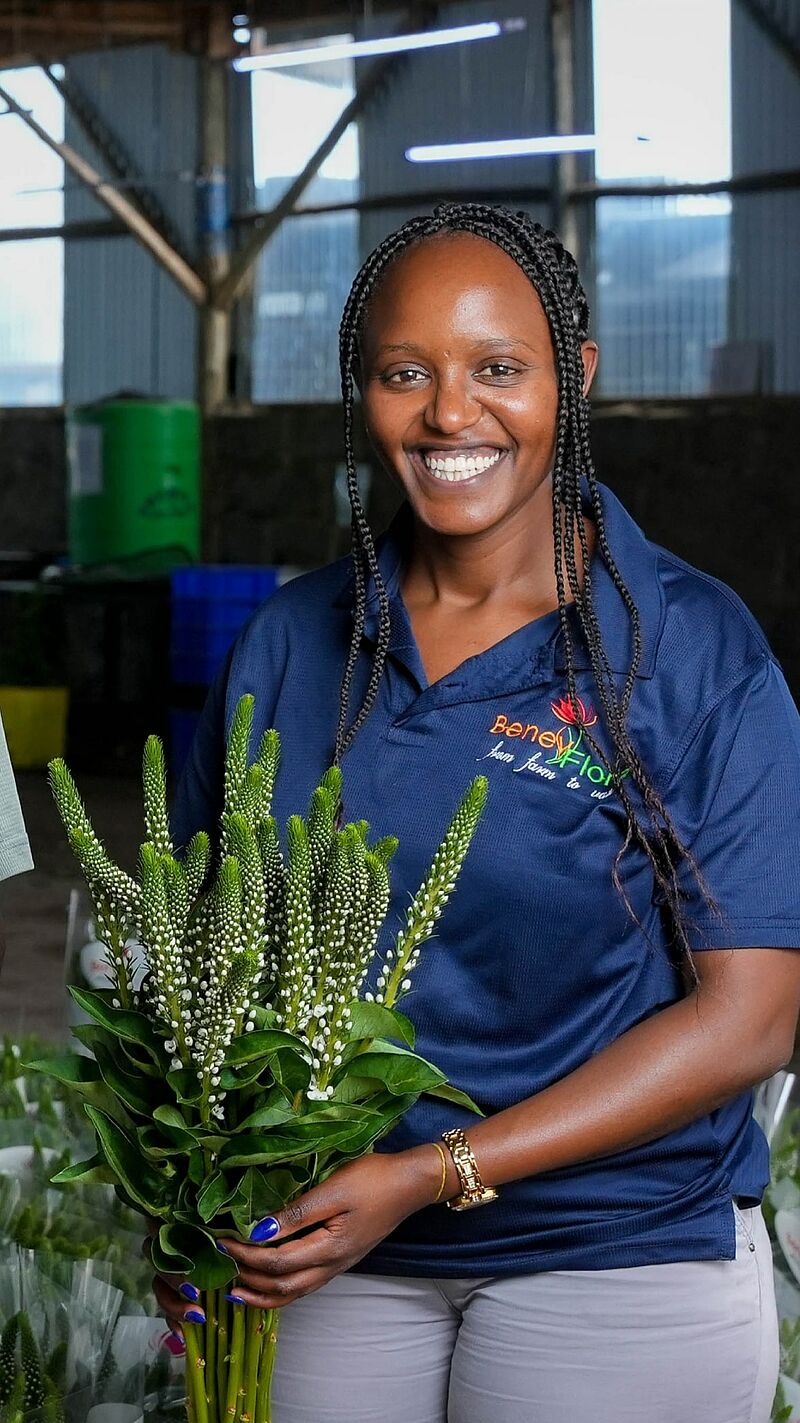Here you can find out more about the latest news from Partners in Transformation, which we have already briefly presented to you in our newsletter.
You want to subscribe to the newsletter? Please register here.
News from the Partners in Transformation (3-2025)

DSIK - Fintech and agrotech – digital solutions for a sustainable future

The German Sparkassenstiftung for International Cooperation (DSIK) will be represented at the upcoming Hamburg Sustainability Conference (HSC) with a solution pitch. Its focus will be on how digital innovations in agriculture and finance can make tangible contributions to sustainable development. DSIK is pairing fintech with agrotech to strengthen smallholders in partner countries. In programmes such as agro.connect, digital solutions ensure that farmers are able to obtain loans more easily, do business more efficiently and thus increase their yields. In this context, digitalisation not only helps in terms of reducing poverty but also in using natural resources more sustainably.
Digitalisation – a concrete example
A key instrument is the connect programme – a practice-oriented ‘accelerator approach’ used by DSIK to bring start-ups into contact with rural organisations in order to jointly develop new solutions. The process begins by analysing the landscape and needs in the respective target region. Following this, suitable start-ups are identified and matched with local organisations in tandems. These are assisted by mentors whose focus is not only on providing technical support, but also targeted training courses on basic digital literacy for the rural partners and business mentoring for the start-ups. The start-ups then present their new solutions and are introduced to local organisations.
One of the countries in which this model has been successfully implemented is Mexico, as part of the agro.connect programme. There, the introduction of digital processes cut the average processing time for agricultural loans down from 30 to just 1.5 days, marking a real step forward for small agricultural enterprises in remote regions.
The connect programme of DSIK
The connect programme can be deployed on a flexible basis: whereas agro.connect is aimed at agriculture, green.connect focuses on climate-resilient products and silver.connect on solutions for people aged 60 and over. Yet the principle remains the same: targeted support for innovations in order to strengthen rural regions economically, encourage social participation and support environmental sustainability. These innovative approaches contribute directly to the global Sustainable Development Goals – in particular SDG 2 (Zero hunger) and SDG 9 (Industry, innovation and infrastructure).
Learn more about the current silver.connect programme in Latin America on YouTube (Spanish only).
Learn more about the projects supported by DSIK here.
Solution pitches of Partners in Transformation:
02.06., 2:05 – 2:25 pm develoPPP: How GIZ and GEO Biogas & Carbon shape the future of aviation with biogas-based fuel made in Brazil
03.06., 11:05 – 11:25 am develoPPP: How GIZ and Makedonski Telekom propel public water services in North Macedonia into the digital age
03.06., 2:25 – 2:45 pm develoPPP and ImpactConnect: How DEG and DEG Impulse support German companies in emerging markets world-wide
03.06., 2:45 – 3:05 pm DSIK - Fintech & Agrotech: Driving Sustainable Growth Through Digital Innovation
develoPPP - multi-programme financing and support for Kenyan–German organic producer

Limbua is a Kenyan–German enterprise that produces and markets organic products such as macadamia nuts, avocados and mangos. The company has developed its own digital system to facilitate fair trade with smallholder farmers while guaranteeing transparency along the supply and value chain. This means that a product such as a macadamia nut is traceable worldwide from the smallholding to the customer. Limbua also receives support from the two Partners in Transformation programmes, ImpactConnect and develoPPP, which are implemented by DEG and its subsidiary DEG Impulse on behalf of the German Federal Ministry for Economic Cooperation and Development (BMZ).
ImpactConnect has actively supported Limbua for the last five years, providing advice and multiple financing tranches to boost the company’s positive economic development. DEG’s financing programme has funded the expansion of Limbua’s production plants in Kenya. In addition to support in implementing innovative processing technologies, a further financing tranche from DEG has enabled the company to introduce sustainable packaging solutions. Also, innovative processing technologies have been introduced and around 400 new jobs have been created since the first financing in 2020. This allows Limbua to meet the very highest quality standards in all areas – from growing and processing through to marketing.
Limbua works with more than 9,000 smallholders, who receive fair, transparent payment generally 100% higher than the market price of the unprocessed goods. This contributes significantly to positive development and growing prosperity in the region. Moreover, Limbua invests in local infrastructure and education programmes that benefit local society, thus actively boosting the resilience of rural communities. This is important, because smallholders in Kenya in particular increasingly face considerable challenges as a result of extreme weather events such as persistent drought, heavy downpours and torrential rain.
In response to these challenges, DEG Impulse supports the Kenyan–German company through the develoPPP funding programme with a view to promoting climate resilience and productivity in Kenyan supply chains. Limbua is investing around EUR 1 million in the integration of circular, nature-based solutions along the supply chain to achieve these aims. DEG Impulse is also making around EUR 1 million available from funds provided by BMZ. This funding is being used to produce around 1,655 tonnes of vegetable charcoal, plant 148,500 mixed tree seedlings and train more than 7,000 farmers and staff.
Limbua recently received the German Government’s CSR award for its use of innovative solutions to create a transparent supply and value chain. In total, around 150 companies were nominated for the prize in five different categories.
IPD - Trading opportunities with Kenya: direct and sustainable

Kenya is famous worldwide for its rose industry, yet the country also has much more to offer in the agricultural sector. From fresh flowers to tropical fruits and vegetables – there is high demand for many of the country’s high-quality products on the European market.
Kenya’s well-organised companies and high production standards make it a particularly attractive trading partner. Its geographical proximity to Europe and optimised logistics structures facilitate direct trade. In addition, the Economic Partnership Agreement between the EU and Kenya, which entered into force in July 2024, guarantees duty-free access to the European market for Kenyan products.
IPD promotes direct trade
The Import Promotion Desk (IPD) has been helping Kenyan producers export their products directly to Europe since 2022. The aim is to make it easier for companies to access the market and to build long-term connections with European importers.
The results speak for themselves:
- IPD has 23 Kenyan companies from the fruit and vegetable and the cut flowers sectors on its books.
- IPD’s support has led to 209 business deals so far. This has generated an export volume of EUR 36 million.
- Since they began working with IPD, the companies have increased their number of employees by around 46 per cent.
- The 23 IPD partner companies now employ around 2,170 permanent staff and 1,270 seasonal workers.
Successful examples
Benev Flora and Chalar Farms are two IPD partners that show how much potential Kenya’s cut flowers and fresh fruit and vegetables sectors offer. Expanding their direct trade has allowed them to tap into new growth opportunities and expand their horizons. These companies are representative of the many other producers that are benefiting from direct cooperation with European buyers.
Find out more about this success story and the opportunities provided by direct trade with Kenyahere.
Human rights in China: Volkswagen and the Helpdesk focus on cooperation
When it comes to human rights due diligence along global supply chains, China is in the spotlight - and Volkswagen is right in the middle of it. In order to promote the topic at the highest level, the Group has launched a three-part series of workshops together with the Helpdesk on Business and Human Rights. The objective was to combine company-wide commitment with specific expertise on China. The starting point was a direct exchange between the Group's Human Rights Officer, Dr Kerstin Waltenberg, and the experts from the Helpdesk. The result: an innovative training format that connects decision-makers from a wide range of Group divisions and sensitises them to the complex challenges in the Chinese context.
"The Helpdesk on Business and Human Rights enabled us to exchange ideas with experts with technical and cultural expertise on the topic of human rights in China as part of a workshop. The best practices and their local characteristics were particularly valuable and supportive for our actions," says Dr Kerstin Waltenberg, Human Rights Officer at the Volkswagen Group.
The series impressively demonstrates how companies and external expertise can jointly develop effective solutions and how specific changes can be initiated through dialogue, exchange and practical support. For an overview of all events and workshops coming please see here.
You can find out more about the Helpdesk on Business and Human Rights here.
Published on